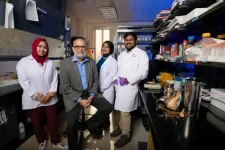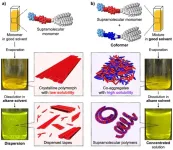(Press-News.org) EL PASO, Texas (Nov. 21, 2023) – Neurodegenerative disorders, including Alzheimer’s, Parkinson’s and Huntington’s, affect millions of people in the United States, and the cost of caring for people who live with these conditions adds up to hundreds of billions of dollars each year.
Now, researchers from The University of Texas at El Paso may potentially have found a solution in used coffee grounds — a material that is discarded from homes and businesses around the world every day.
A team led by Jyotish Kumar, a doctoral student in the Department of Chemistry and Biochemistry, and overseen by Mahesh Narayan, Ph.D., a professor and Fellow of the Royal Society of Chemistry in the same department, found that caffeic-acid based Carbon Quantum Dots (CACQDs), which can be derived from spent coffee grounds, have the potential to protect brain cells from the damage caused by several neurodegenerative diseases — if the condition is triggered by factors such as obesity, age and exposure to pesticides and other toxic environmental chemicals. Their work is described in a paper published in the November issue of the journal Environmental Research.
“Caffeic-acid based Carbon Quantum Dots have the potential to be transformative in the treatment of neurodegenerative disorders,” Kumar said. “This is because none of the current treatments resolve the diseases; they only help manage the symptoms. Our aim is to find a cure by addressing the atomic and molecular underpinnings that drive these conditions.”
Neurodegenerative diseases are primarily characterized by the loss of neurons or brain cells. They inhibit a person’s ability to perform basic functions such as movement and speech, as well as more complicated tasks including bladder and bowel functions, and cognitive abilities.
The disorders, when they are in their early stages and are caused by lifestyle or environmental factors, share several traits. These include elevated levels of free radicals — harmful molecules that are known to contribute to other diseases such as cancer, heart disease and vision loss — in the brain, and the aggregation of fragments of amyloid-forming proteins that can lead to plaques or fibrils in the brain.
Kumar and his colleagues found that CACQDs were neuroprotective across test tube experiments, cell lines and other models of Parkinson’s disease when the disorder was caused by a pesticide called paraquat. The CACQDs, the team observed, were able to remove free radicals or prevent them from causing damage and inhibited the aggregation of amyloid protein fragments without causing any significant side effects.
The team hypothesizes that in humans, in the very early stage of a condition such as Alzheimer’s or Parkinson’s, a treatment based on CACQDs can be effective in preventing full-on disease.
“It is critical to address these disorders before they reach the clinical stage,” Narayan said. “At that point, it is likely too late. Any current treatments that can address advanced symptoms of neurodegenerative disease are simply beyond the means of most people. Our aim is to come up with a solution that can prevent most cases of these conditions at a cost that is manageable for as many patients as possible.”
Caffeic acid belongs to a family of compounds called polyphenols, which are plant-based compounds known for their antioxidant, or free radical-scavenging properties. Caffeic acid is unique because it can penetrate the blood-brain barrier and is thus able to exert its effects upon the cells inside the brain, Narayan said.
The process the team uses to extract CACQDs from used coffee grounds is considered “green chemistry,” which means it is environmentally friendly. In their lab, the team “cooks” samples of coffee grounds at 200 degrees for four hours to reorient the caffeic acid’s carbon structure and form CACQDs. The sheer abundance of coffee grounds is what makes the process both economical and sustainable, Narayan said.
The research was supported by a grant from the National Institutes of Health. In addition to Kumar, dozens of graduate and undergraduate UTEP students have worked on this project with Narayan including Sofia Delgado a former UTEP undergraduate student who is now pursuing her Ph.D. at Yale University.
The researchers will now seek additional funding to support further testing.
Narayan and Kumar both said they know the finish line is still far off. But, for now, they are moving forward on a journey that may ultimately lead to a medication – a pill, perhaps – that may prevent the vast majority of neurodegenerative disorders that are caused by factors other than genetics.
About The University of Texas at El Paso
The University of Texas at El Paso is America’s leading Hispanic-serving university. Located at the westernmost tip of Texas, where three states and two countries converge along the Rio Grande, 84% of our 24,000 students are Hispanic, and more than half are the first in their families to go to college. UTEP offers 171 bachelor’s, master’s and doctoral degree programs at the only open-access, top-tier research university in America.
END
Coffee grounds may hold key to preventing neurodegenerative diseases
UTEP researchers create therapy that is both economical, sustainable
2023-11-21
ELSE PRESS RELEASES FROM THIS DATE:
Gender stereotypes embedded in natural language
2023-11-21
Gender stereotypes harm people of both genders—and society more broadly—by steering and sometimes limiting people to behaviors, roles, and activities linked with their gender. Widely shared stereotypes include the assumption that men are more central to professional life while women are more central to domestic life. Other stereotypes link men with math and science and women with arts and liberal arts. Perhaps surprisingly, research has shown that countries with higher economic development, individualism, and gender-equality tend to also have more pronounced gender differences in several domains, ...
An effective approach for preparing supramolecular polymers at high concentration
2023-11-21
Supramolecular polymers (SPs) are molecular assemblies composed of non-covalently bonded small molecules. They show high recyclability originating from their dynamic nature of monomer binding, which is different from covalent polymers with non-biodegradable nature. The small repeating units that form SPs, called monomers, are specifically designed to construct multiple non-covalent bonds to enhance the stability of the resulting SPs. Such monomers can be organized into structurally distinct assemblies by forming various ...
Microautophagy is essential for preventing aging
2023-11-21
Osaka, Japan – To age or not to age! How does aging affect organisms on a cellular level? What mechanisms help cells survive self-inflicted or external harm? It is known that lysosomes—critically important cellular structures—are crucial for digesting damaged cellular components and pathogens, and maintain stability within cells and tissues. But can they also be repaired, and if so, how?
In a study published this month in EMBO Reports, researchers from Osaka University and Nara Medical University have shown that damaged lysosomes are repaired by a mechanism called “microautophagy” and have identified two key regulators of this ...
Mount Sinai Health System names Brendan Carr, MD, MA, MS, as next Chief Executive Officer
2023-11-21
Mount Sinai Health System announced that Brendan Carr, MD, MA, MS, a nationally recognized leader in academic medicine and health policy, will be its next Chief Executive Officer.
Dr. Carr joined Mount Sinai as its head of emergency medicine in February 2020, just before New York City became the initial epicenter of the COVID-19 pandemic in the United States. He played a critical role during the pandemic and led local, regional, and national initiatives focused on improving the Health System’s emergency and critical care capacity. He was ...
The Paul G. Allen Family Foundation awards $10.5 million to new Allen Distinguished Investigators
2023-11-21
SEATTLE, WASH.—November 21, 2023—Uncovering biological properties of extracellular vesicles, which play a vital role in how cells communicate, and understanding how sex hormones drive behavior and development are two areas that the new cohorts of Allen Distinguished Investigators will research, thanks to over $10 million in funding from the Paul G. Allen Family Foundation. The 18 researchers will develop technologies, design approaches, and uncover insights into fundamental areas of human biology.
2023 Allen Distinguished Investigators
Kenneth Witwer, ...
Novel AI system could diagnose autism much earlier
2023-11-21
CHICAGO – A newly developed artificial intelligence (AI) system that analyzes specialized MRIs of the brain accurately diagnosed children between the ages of 24 and 48 months with autism at a 98.5% accuracy rate, according to research being presented next week at the annual meeting of the Radiological Society of North America (RSNA).
Mohamed Khudri, B.Sc., a visiting research scholar at the University of Louisville in Kentucky, was part of a multi-disciplinary team that developed the three-stage system to analyze and classify diffusion tensor MRI (DT-MRI) of the brain. DT-MRI is a special technique that detects how water travels along white matter tracts in the brain.
“Our ...
MRI reveals brain activity behind fanaticism
2023-11-21
CHICAGO – Soccer fans exhibit different patterns of brain activation while watching a match that may trigger positive and negative emotions and behaviors, according to research being presented next week at the annual meeting of the Radiological Society of North America (RSNA). The researchers say the implication of these findings could extend beyond sports to fanaticism in other areas, such as politics.
“This study aims to shed light on the behaviors and dynamics associated with extreme rivalry, aggression and social affiliation within and between groups of fanatics,” said the study’s lead author, Francisco Zamorano ...
Computer simulation suggests mutant strains of COVID-19 emerged in response to human behavior
2023-11-21
Using artificial intelligence technology and mathematical modeling, a research group led by Nagoya University has revealed that human behavior, such as lockdowns and isolation measures, affect the evolution of new strains of COVID-19. SARS-CoV-2, the virus that causes COVID-19, developed to become more transmissible earlier in its lifecycle. The researcher’s findings, published in Nature Communications, provide new insights into the relationship between how people behave and disease-causing agents.
As with any other living organism, viruses evolve over time. Those with survival advantages become dominant in the gene pool. Many environmental factors ...
Babies as young as four months show signs of self-awareness - study
2023-11-21
Babies as young as four months old can make sense of how their bodies interact with the space around them, according to new research from the University of Birmingham.
The findings, published today (21 November 2023) in Scientific Reports, shed new light on how self-awareness develops.
Experts from the Birmingham BabyLab showed babies a ball on a screen moving towards or away from them. When the ball was closest to them on the screen, the babies were presented with a ‘touch’ (a small vibration) on their hands, whilst their brain activity was being measured. The data collection for the study was conducted at Goldsmiths (University of London).
The researchers ...
Trilobites rise from the ashes to reveal ancient map
2023-11-21
Ten newly discovered species of trilobites, hidden for 490 million years in a little-studied part of Thailand, could be the missing pieces in an intricate puzzle of ancient world geography.
Trilobites are extinct sea creatures with half-moon-shaped heads that breathed through their legs. A 100-page monograph in the British journal offers great detail about the new species, including one named in honor of Thai Royal Princess Maha Chakri Sirindhorn.
The trilobite fossils were trapped between layers of petrified ash in sandstone, ...
LAST 30 PRESS RELEASES:
Bureaucracy Index 2026: Business sector hit hardest
ECMWF’s portable global forecasting model OpenIFS now available for all
Yale study challenges notion that aging means decline, finds many older adults improve over time
Korean researchers enable early detection of brain disorders with a single drop of saliva!
Swipe right, but safer
Duke-NUS scientists identify more effective way to detect poultry viruses in live markets
Low-intensity treadmill exercise preconditioning mitigates post-stroke injury in mouse models
How moss helped solve a grave-robbing mystery
How much sleep do teens get? Six-seven hours.
Patients regain weight rapidly after stopping weight loss drugs – but still keep off a quarter of weight lost
GLP-1 diabetes drugs linked to reduced risk of addiction and substance-related death
Councils face industry legal threats for campaigns warning against wood burning stoves
GLP-1 medications get at the heart of addiction: study
Global trauma study highlights shared learning as interest in whole blood resurges
Almost a third of Gen Z men agree a wife should obey her husband
Trapping light on thermal photodetectors shatters speed records
New review highlights the future of tubular solid oxide fuel cells for clean energy systems
Pig farm ammonia pollution may indirectly accelerate climate warming, new study finds
Modified biochar helps compost retain nitrogen and build richer soil organic matter
First gene regulation clinical trials for epilepsy show promising results
Life-changing drug identified for children with rare epilepsy
Husker researchers collaborate to explore fear of spiders
Mayo Clinic researchers discover hidden brain map that may improve epilepsy care
NYCST announces Round 2 Awards for space technology projects
How the Dobbs decision and abortion restrictions changed where medical students apply to residency programs
Microwave frying can help lower oil content for healthier French fries
In MS, wearable sensors may help identify people at risk of worsening disability
Study: Football associated with nearly one in five brain injuries in youth sports
Machine-learning immune-system analysis study may hold clues to personalized medicine
A promising potential therapeutic strategy for Rett syndrome
[Press-News.org] Coffee grounds may hold key to preventing neurodegenerative diseasesUTEP researchers create therapy that is both economical, sustainable











